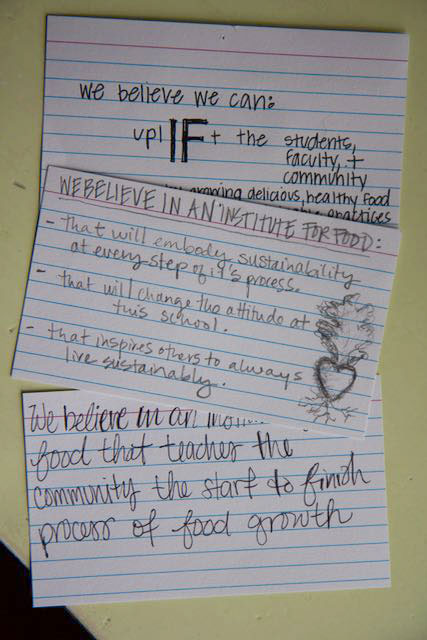The Institute for Food at Miami University


An innovative solution in support of healthy eating, healthy food, healthy communities, and a healthy planet

Mission
The Institute for Food at Miami University is a collaborative initiative to engage diverse communities around issues of food, health, and sustainable agriculture. We are working to build an interdisciplinary curriculum, a 35-acre organic university farm, a community garden, and an experiential education center to promote greater awareness of food systems that support individual health, resilient communities, and agricultural sustainability. Fostering local knowledge about food in global context, we believe access to nutritious, affordable, sustainably produced food provides for healthy individuals, healthy communities, and sustainable economies. Our goal is to create a signature Institute for Food at Miami; prepare future leaders to imagine and enact a better food future; use experiential learning to inspire new intersections between health, sustainable agriculture, and resilient communities; foster engaged collaboration between students, faculty, community members, and industry; and tackle big issues using creative problem solving to discover innovative solutions in support of healthy eating, healthy food, healthy communities, and a healthy planet.
The Miami Food Studies Institute brings together students, faculty, and staff from the College of Arts and Science, the College of Education, Health, and Society, the Farmer School of Business, the College of Creative Arts, and the College of Engineering and Computing, and builds on a number of established Miami programs including the Institute for the Environment and Sustainability, the Ecology Research Center, the Department of Global and Intercultural Studies, Nutrition and Dietetics, and Supply Chain Management. We are dedicated to supporting collaborative research, experiential education, sustainable policy, and community partnerships to facilitate transformative learning and new knowledge about food, health, and farming.
Farming location
The locus of the institute for food is the university organic farm and experiential education center. Located on the university owned, historic Austin-Magie Farm, celebrating Ohio’s significant agricultural history, the farm embodies Miami’s signature commitment to engaged liberal arts learning where students, faculty, staff, and community members come together to explore and understand food as it moves from the soil to the plate. The farm capitalizes on Miami’s rural setting and land assets, provides a space for hands-on learning and research, while enhancing the university’s commitment to sustainability and ecological research. In this way, the farm, which is adjacent to the Ecology Research Center, will serve as the Institute’s laboratory and hub, supporting experiential learning, collaborative research, and community partnerships. This is where students will explore and learn the science of organic farming, the business of sustainable agriculture and food distribution, the practices of growing and preparing healthy foods, and the history and culture of cuisine. Conceived as a working farm to supply Miami’s Demske Culinary Support Center with locally produced organic vegetables for niversity dining services, the farm is set up to be a fully operational business, which will play an important role in the Institute for Food’s mixed revenue plan supplementing tuition revenue, external grants, foundation support, and endowment funds. In sum, the university organic farm is the heart of Miami’s Institute for Food; it serves as both a research and learning laboratory and a functioning business within the university where students, faculty, and community members can forge new connections between food and farming, health and wellness, and environmental and economic sustainability.
Goals
The driving force behind the Miami Food Studies Institute centers on one central question: are we adequately educating students, generating new research, and preparing future leaders to sustainably feed and provide healthy food in a world which is estimated to reach a population of 9.5 billion people by 2050? We believe this is one of the most pressing issues of our generation. It encompasses far-reaching concerns related to individual health, agricultural sustainability, and food security.
With this question in mind, our goal is to explore and address a series of overlapping issues:
- Sustainable agriculture, biodiversity, and resilient ecosystems
- New food markets and food-related social entrepreneurship
- Food security and food sovereignty in local and global contexts
- Food-centered media
- Fair production practices and equitable access to nutritious and affordable food
- Intercultural knowledge centered on food; awareness of diverse cultural traditions, practices, and identities linked to food to support resilient communities
- Sustainable design practices and landscape management that promote pollination, soil & water conservation, and sustainable food production
Funding
A three-year seed grant of $200,000 from the Miami University Provost Innovation & Interdisciplinary Fund has provided initial start up funds to support preliminary site selection and development, curricular and research start up, and temporary staffing. We are currently seeking funds to build and permanently fund the Institute for Food at Miami University.
Contacts
Alfredo Huerta (huertaaj@miamioh.edu)
Peggy Shaffer (shaffems@miamioh.edu)

